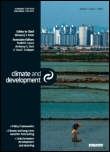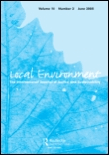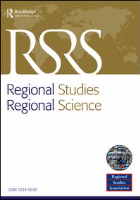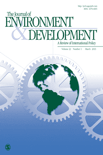
Climate and Development
Scope & Guideline
Bridging Climate Science and Development Practice
Introduction
Aims and Scopes
- Climate Adaptation Strategies:
The journal explores various climate adaptation strategies, particularly in agricultural contexts, emphasizing the importance of local practices, technologies, and community engagement in enhancing resilience. - Impacts of Climate Change on Vulnerable Populations:
Research often highlights the socio-economic impacts of climate change on marginalized communities, focusing on gender, migration, and health, thus advocating for inclusive policies. - Interdisciplinary Approaches:
The journal encourages interdisciplinary research that integrates insights from social sciences, environmental studies, and development economics to create holistic solutions for climate challenges. - Indigenous Knowledge and Practices:
A unique contribution of the journal is its emphasis on incorporating indigenous knowledge and practices into climate adaptation and resilience strategies, recognizing the value of local expertise. - Governance and Policy Frameworks:
The journal addresses the governance aspects of climate action, examining national and international policies, and their effectiveness in fostering sustainable development and climate resilience.
Trending and Emerging
- Gender and Climate Change:
There is an increasing focus on gender dynamics in climate change adaptation, recognizing the different vulnerabilities and capacities of men and women, and advocating for gender-responsive climate policies. - Climate Migration and Displacement:
Emerging research is exploring the nexus between climate change and migration, particularly how environmental factors drive displacement and how social protection can mitigate these impacts. - Local and Community-Based Adaptation:
A significant trend is the emphasis on local knowledge and community-driven adaptation strategies, highlighting the importance of grassroots involvement in climate resilience initiatives. - Intersection of Health and Climate Change:
Recent studies are increasingly addressing the health impacts of climate change, exploring the links between environmental changes and public health outcomes, particularly in vulnerable populations. - Climate Justice and Equity:
The discourse around climate justice is gaining traction, focusing on the equitable distribution of resources and responsibilities in climate action, and addressing historical injustices faced by marginalized communities.
Declining or Waning
- Traditional Agricultural Practices:
There has been a noticeable decline in the focus on traditional agricultural practices without the context of climate-smart agriculture, as the journal pivots towards more innovative and adaptive approaches. - Generalized Climate Change Impact Assessments:
Previous years saw a greater emphasis on broad assessments of climate change impacts across various sectors. However, the current trend favors more specific studies that target localized adaptations and community responses. - Purely Economic Analyses:
The journal is moving away from analyses that solely focus on economic implications of climate change, instead integrating social and environmental dimensions to create a more comprehensive understanding of climate resilience.
Similar Journals

Local Environment
Navigating the complexities of local and global environments.Local Environment is a prestigious academic journal focused on the multifaceted relationships between local environmental changes and global issues, aiming to bridge the gap between policy, community engagement, and sustainable development. Published by ROUTLEDGE JOURNALS, TAYLOR & FRANCIS LTD, this journal has established itself as a leading platform in the fields of geography, planning, and environmental management, boasting an impressive Q1 ranking in Geography, Planning and Development, and a Q2 ranking in Management, Monitoring, Policy and Law for 2023. The journal, with an ISSN of 1354-9839 and E-ISSN 1469-6711, provides an essential resource for researchers, professionals, and students dedicated to exploring innovative approaches to local environmental issues, making significant contributions to both academic scholarship and practical policy implementation. With a commitment to disseminating high-quality research from 1996 to 2024, Local Environment encompasses a wide range of topics crucial for understanding local actions in a global context, further ensuring its relevance and impact in a rapidly changing world.

Mitigation and Adaptation Strategies for Global Change
Empowering Research for Sustainable FuturesMitigation and Adaptation Strategies for Global Change is a prestigious journal published by SPRINGER, focusing on the critical areas of ecology and global change. With an impressive impact factor that places it in the Q1 and Q2 quartiles in their respective categories, this journal serves as an essential platform for researchers, professionals, and students actively engaged in addressing the challenges posed by climate and environmental changes. Since its inception in 1996, the journal has evolved to cover a wide range of interdisciplinary topics, fostering a holistic understanding of mitigation strategies and adaptation practices worldwide. Located in the Netherlands, it benefits from a robust editorial board and significant contributions from leading experts in the field. Although it does not currently offer Open Access, the journal's rigorous peer-review process ensures that only high-quality research is disseminated, making it a valuable resource for anyone seeking to remain at the forefront of global change research.

Urban Forum
Illuminating Critical Urban Issues Through ResearchUrban Forum is a prestigious academic journal published by SPRINGERNATURE that has been a key contributor to the fields of Urban Studies and Geography, Planning and Development since its inception in 1990. With a significant impact factor reflective of its rigorous peer-reviewed research, the journal is currently ranked in the Q2 category, demonstrating its influence and importance in advancing knowledge within these domains. Based in the Netherlands, Urban Forum provides a platform for researchers, professionals, and students to explore critical urban issues, foster interdisciplinary dialogue, and disseminate innovative studies that shape urban policy and planning practices. Although the journal is not open access, it remains accessible through various academic databases, ensuring a wide reach within the scholarly community. Engaging with Urban Forum means being at the forefront of contemporary urban research, making it an essential resource for anyone dedicated to understanding and enhancing urban living and planning.

Regional Studies Regional Science
Exploring the Dynamics of Regional ImpactRegional Studies Regional Science is a pioneering journal published by Routledge Journals, Taylor & Francis Ltd, specializing in the interdisciplinary examination of regional dynamics and their effects on economic, social, and environmental landscapes. Established as an open-access journal since 2014, it ensures widespread dissemination of knowledge, promoting accessibility for researchers, professionals, and students alike. Based in the United Kingdom, this journal has garnered a notable reputation, holding a Category Quartile ranking of Q2 in 2023 across various fields, including Economics and Econometrics, Geography, Planning and Development, and Sociology and Political Science. Its rankings in the Scopus database reflect its growing influence within the social sciences, positioning it as a valuable resource for contemporary regional studies. With a commitment to high-quality research, Regional Studies Regional Science serves as a vital platform for the exchange of innovative ideas and empirical findings that address the pressing challenges faced by regions worldwide.

Frontiers in Climate
Exploring the multifaceted impacts of climate change.Frontiers in Climate is a pioneering open-access journal published by FRONTIERS MEDIA SA, dedicated to advancing the understanding of climate science and its multifaceted impacts on the environment and society. Since its inception in 2019, the journal has established itself as a crucial platform for researchers and professionals, contributing significantly to fields such as atmospheric science, environmental policy, and pollution management, achieving commendable rankings within various categories. With an impressive quartile categorization of Q1 in Environmental Science (miscellaneous), Management, Monitoring, Policy and Law, and Pollution, as well as Q2 in Atmospheric Science and Global and Planetary Change for the year 2023, it reflects high-quality scholarly output and relevance in the academic community. The journal's commitment to open access ensures that vital research is accessible to all, fostering collaboration and innovation in tackling the pressing issues related to climate change. Whether you are a researcher, policymaker, or student, Frontiers in Climate is an essential resource for advancing knowledge and implementing solutions for a sustainable future.

Journal of Agriculture and Environment for International Development
Empowering Research at the Intersection of Agri-Environment and DevelopmentJournal of Agriculture and Environment for International Development, published by AGENZIA ITALIANA COOPERAZIONE SVILUPPO-ITALIAN DEV COOP AGENCY, is a vital platform advancing research at the intersection of agricultural practices, environmental sustainability, and international development. Since its inception, this Open Access journal has aimed to disseminate knowledge and innovative strategies that address global challenges in the agri-environment sector. With ISSN 2240-2802, this esteemed publication is situated in Italy and has maintained an unwavering commitment to accessibility since 2011, encouraging widespread engagement amongst researchers and practitioners. Although currently ranked in the Q4 quartile across various categories including Agricultural and Biological Sciences and Environmental Science, the journal is dedicated to covering crucial topics that contribute to sustainable development, thus serving as an invaluable resource for scholars and policymakers alike. The convergence years from 2016 to 2024 reflect the journal's adaptive approach to evolving global trends, ensuring its relevance in a rapidly changing academic landscape.

Desenvolvimento e Meio Ambiente
Connecting disciplines to tackle environmental challenges.Desenvolvimento e Meio Ambiente is a pioneering open-access journal published by Universidade Federal do Paraná, Editora, committed to advancing knowledge in the fields of Environmental Science and Geography. Established in 2000, this Brazilian journal serves as a vital platform for researchers, professionals, and students to share interdisciplinary studies that address the pressing environmental challenges faced in both local and global contexts. With an E-ISSN of 2176-9109, this journal is particularly significant given its current quartile rankings of Q4 in Environmental Science (miscellaneous) and Geography, Planning, and Development in 2023. Although it has a modest impact factor reflected by its Scopus ranks—691/821 and 206/233 within their respective categories—the journal is dedicated to elevating the discourse surrounding sustainable development practices. With a convergence period extending from 2018 to 2024, Desenvolvimento e Meio Ambiente is an essential resource for anyone invested in the intersection of environmental studies and social sciences, fostering a community of inquiry and collaboration amidst Brazil's unique ecological landscape.

Nature Climate Change
Shaping Tomorrow's Climate Insights TodayNature Climate Change, published by NATURE PORTFOLIO, is a leading peer-reviewed journal in the fields of Environmental Science and Social Sciences. Established in 2011, this journal has garnered significant acclaim, with an impressive impact factor reflected in its 2023 Q1 ranking in both categories, making it rank #1 in Environmental Science (miscellaneous) and Social Sciences (miscellaneous), placing it in the 99th percentile. The journal aims to provide a comprehensive platform for the latest research and developments related to the social, economic, and environmental dimensions of climate change, thus fostering interdisciplinary dialogue and collaboration. Researchers, professionals, and students alike benefit from the journal's commitment to addressing the urgent challenges posed by climate change through innovative research, reviews, and commentary. Although not open access, the journal remains pivotal in shaping global discussions and policies surrounding climate issues. For those seeking indicative research trends and influences in climate change scholarship, Nature Climate Change serves as an essential resource that highlights innovative solutions and actionable insights.

Environmental Policy and Governance
Exploring Best Practices in Environmental GovernanceEnvironmental Policy and Governance is a premier academic journal published by WILEY PERIODICALS, INC, based in the United Kingdom, dedicated to advancing the understanding and implementation of environmental policy across various governance frameworks. With an ISSN of 1756-932X and E-ISSN 1756-9338, this journal spans from 2009 to 2024, reflecting a rich history of contributions to the field. Renowned for its rigorous scholarship, it holds a prestigious Q1 ranking in both Geography, Planning and Development and Management, Monitoring, Policy and Law, positioning it in the top tier of academic discourse. The journal has made significant strides in promoting interdisciplinary research, fostering dialogue among policymakers, scholars, and practitioners, and addressing pressing global environmental challenges. Although currently not an Open Access publication, its high impact factor underlines its relevance and authority, making it an essential resource for researchers, professionals, and students eager to explore innovative solutions and best practices in environmental governance.

Journal of Environment & Development
Empowering Voices in Environment and DevelopmentJournal of Environment & Development is a leading scholarly journal published by SAGE Publications Inc, aimed at fostering an in-depth understanding of both environmental challenges and developmental strategies. With an ISSN of 1070-4965 and E-ISSN 1552-5465, this journal enjoys a distinguished reputation, reflected in its impressive impact factor and Q1 rankings in the fields of Development, Geography, Planning and Development, as well as its placement in the Q2 category for Management, Monitoring, Policy and Law in 2023. Since its inception in 1992, the journal has provided a vital platform for researchers, policymakers, and practitioners to share innovative ideas and impactful research findings. With SCOPUS ranking it among the top journals in its categories, the Journal of Environment & Development is essential for anyone engaged in addressing the complex interplay between environmental sustainability and human development. This journal is particularly valuable for those pursuing interdisciplinary approaches to tackle pressing societal issues. Although it is not open access, its reputable content remains crucial for those invested in these dynamic fields.